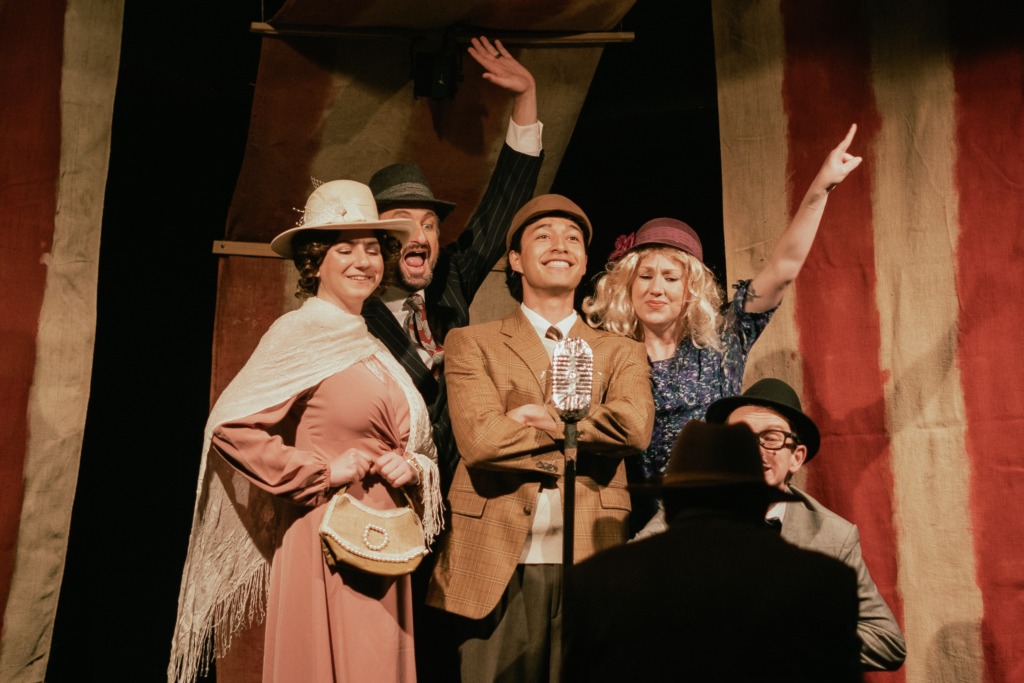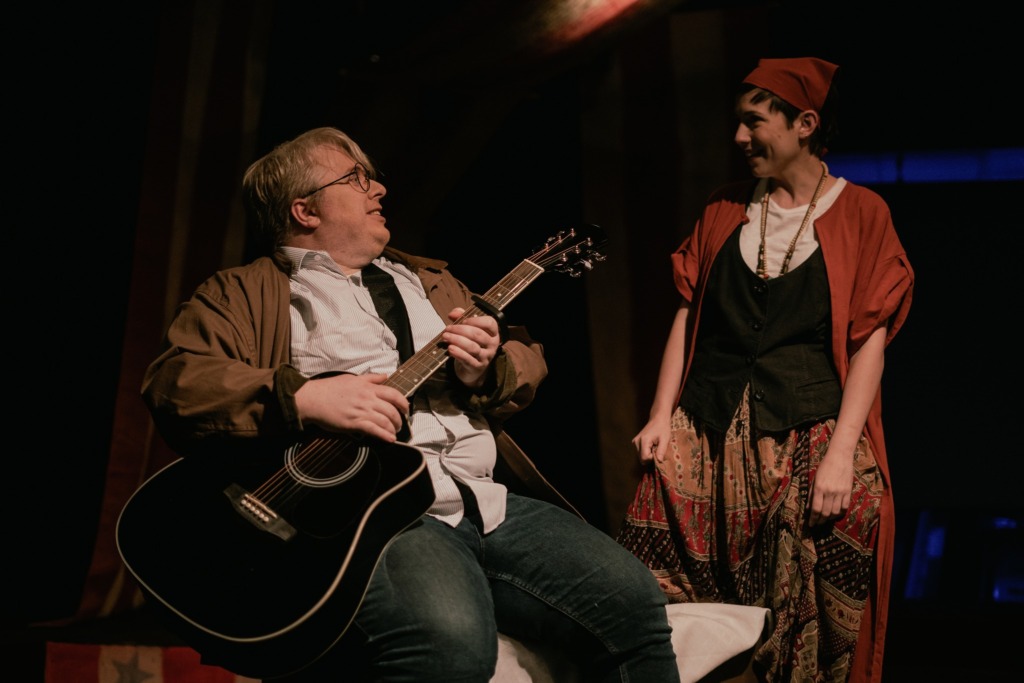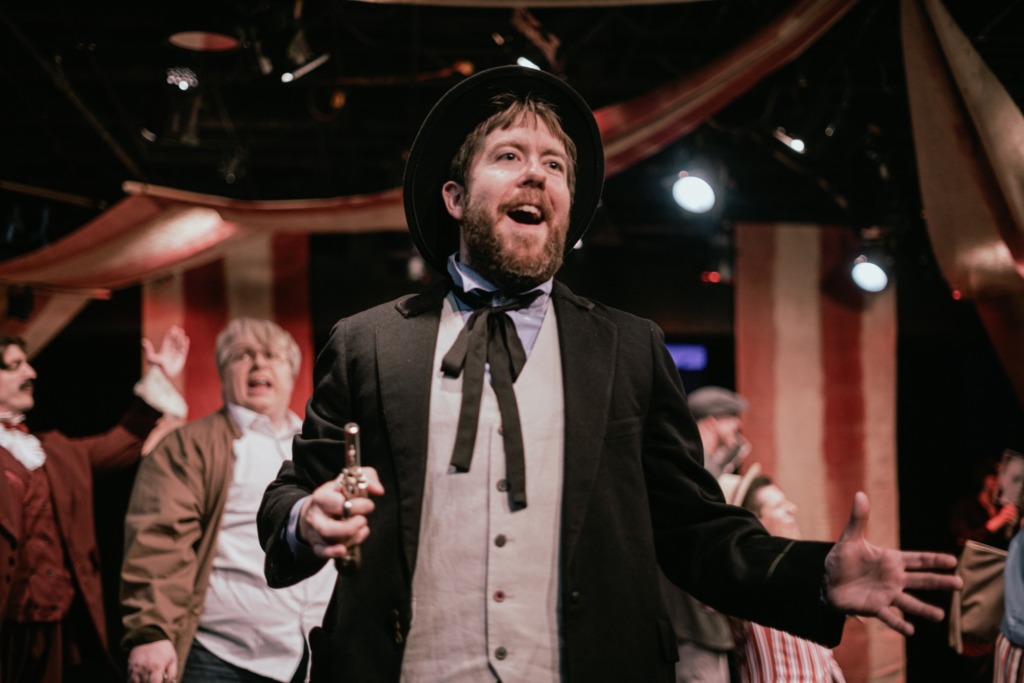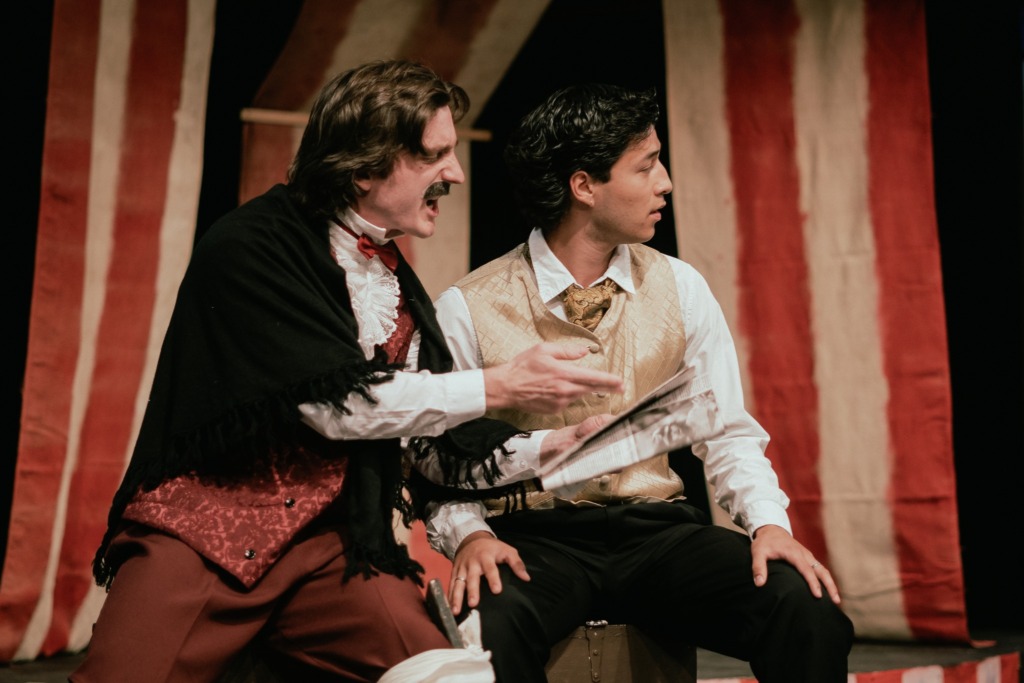author: Amanda N. Gunther
Angry men don’t write the rules and guns don’t right the wrongs. A debatable truth from “The Ballad of Booth” inside of a Sondheim show. What’s not up for debate is the caliber and quality of the production of Assassins now appearing live at Silver Spring Stage— their first musical in 27 years! And it’s quite the impressive feat considering it’s their first musical in nearly three decades and it’s a Sondheim to boot! Directed by Fred Zirm, with Musical Direction by Jenni McGinnis & Alden Michels, and Produced by David Gross with Choreography by Lisa Singleton, this dark and edgy musical is frighteningly poignant and surprisingly well-executed, despite some minor hiccups in the sound and staging department and played to an SRO-opening night house!

If you aren’t familiar with the musical Assassins, based on a concept by Charles Gilbert Jr. with music and lyrics by the late great Stephen Sondheim and libretto by John Weidman, think of it as a historical unraveling of America’s colored past, specifically honing in on presidential assassinations and attempted assassinations. It’s unique in its composition, not only because it’s a Sondheim show with an even balance of spoken scenes to musical numbers but also because it doesn’t necessarily follow along in linear order (as one of the bigger and more recent assassinations, which is not in the last of historical attempts, happens as the last one in the show.) And a note for the audience, if you aren’t aware that certain presidents have been assassinated throughout history— this may come as somewhat of a spoiler and or a surprise to you!
The uniquely challenging space of Silver Spring Stage— being an underground black box with ‘the pilar’ (read: load-bearing support column that would obstruct the view of even the James Webb & Hubble space telescopes) and audience seating banks flanked on the diagonal edges of the stages’ front seams— is no small feat when it comes to setting any performance. Setting a musical is no exception to that rule; Set Designer & Painter Bill Brown draws the audience into the daunting nature of the ‘circus’ that is this production— quite literally with the macabre circus posters that are plastered on the pilar (which may be way of Set Dressing & Properties persons Sandhya K. Kidd & Nancy Carlin) and the red and beige-yellow canvas flaps that create the illusion of a tattered circus tent. The play space itself is left mercifully open, which allows for freedom of movement amongst the 16 performers, though you only get all 16 of them on stage at the same time during the curtain call.
Complimenting Bill Brown’s scenic design work, which really does prime the audience for the darkened verve that floats not only in the show’s libretto and lyrics but in the entire subject matter, is the Lighting Design & Projection Work of Steve Deming. As previously mentioned, this show is about presidential assassinations, so whenever one of the assassins lands their mark, the audience is treated to a glorious flush of red across a printed picture-mask face of said target. But Deming does more than just create red splashes— though it’s definitely a praiseworthy moment, his lighting effect used at the end of “The Ballad of Guiteau” both for its efficacy and the combination ‘free-movement’ the actor puts into achieving that ‘effect’— he also keeps the lighting somewhat dimmed, almost as if to make a comment on how history views these moments. Deming’s projection work, aligning with Director Fred Zirm’s sinister vision of the production, is also spot-on. At first it seems like nothing much to write home about? Black and white photographs in places where you might expect them— pictures of Charlie Manson and Jodi Foster during “Unworthy of Your Love”, which is the ‘duet-apart’ sang by Hinckley and Squeaky Fromme about their respective obsessions, or historical paperwork like Booth’s wanted poster or Emma Goldman’s flyer— but as the show rolls into “An0ther National Anthem”, Deming’s projection work becomes a visceral gut-punch that really draws your emotions into his design. Watch for the January 6th imagery here and then the live action (thankfully grainy) historical film footage at the end of “November 22, 1963 (We’re Your Family)” for a fully eviscerating emotional effect.
Where this production somewhat misses its mark is with the overall sound balance. And that’s to be expected considering that this is Silver Spring Stage’s first musical in 27 years. (That factoid keeps repeating itself because its worth bearing in mind for a whole host of reasons— choosing to do a Sondheim, deciding after nearly three decades to finally produce a musical, taking a chance on this politically unsettling but strikingly poignant show in an election year, etc. Sound Designer Sarah Katz does her best, all things considered, and the issues are mostly when the performers have solos that are of a ‘softer’ emotional nature. The show itself is piped-can (audio tracks as a opposed to a live pit orchestra) and Katz mostly finds the balance of how to keep the music from overwhelming the performers from a volume perspective, but there are still moments where the drop mics just aren’t enough to pick up everything being sung. The sound effects— particularly the gunshots— mostly make their mark, though could at times stand to be a little bit louder. If musicals are to be a part of Silver Spring Stage’s future— and if this inaugural one after a 27-year hiatus is any indication, they should be— the stage may consider ways to fund a higher caliber sound system— including body mics.

Despite the sound issues, the actual singing coming off the stage is impressive. Musical Directors Jenni McGinnis and Alden Michaels certainly hit their respective marks (with the help of a trio of rehearsal pianists— Elizabeth Keys, Sue McElroy, Benjamin Yeung) when it comes to blending voices together, creating a robust sound from the whole company during bigger group numbers, and highlighting the unique vocal strengths of each of their performers. “Gun Song” in particular comes to mind as it starts off as a solo with Czolgosz and one by one the harmonizing beauty of Booth, Guiteau, and Moore are layered into the number, filling the stage with lush and lusty blended vocals, even if the lyrics are ominous and dissonant from the sweeping notes carrying those haunting words.
Director Fred Zirm has an excellent concept in place for this production of Assassins, if somewhat underserved. The character of The Proprietor (played by Ian Swank with a sinister smile and haunting stage presence that will give you the chills long after he leaves the stage) is delivered as this menacingly foreboding caricature of Harold Hill (and conceptually both Zirm and Swank were hitting on this imagery so hard that I had it pop to mind in the first act of the show before reading at the intermission that it was intentional in Zirm’s Director’s Note in the program.) But Zirm misses an excellent opportunity to utilize this concept more. The Proprietor is only scripted for “Everybody’s Got the Right”, as he welcomes each of these potential assassins to this ‘carnival game’ of ‘shooting a president’ and “Another National Anthem.” But as a warped ‘music man’ of sorts, Zirm could have had The Proprietor floating around on stage in the background or in the corner just watching or lurking, to further strengthen this concept of master-conductor, overseeing all of these scenes and songs. It just seems such a shame to not build on such a clever concept, particularly when Ian Swank’s facial expressions are so unsettling and his presence on stage so mesmerizing. (Swank, along with the rest of the company, is assisted tremendously by Costume, Hair, and Make-Up Designer Jennifer Morrissey, who finds all sorts of era-appropriate togs for each character, though none so odiously-perfect as that maroon-burgundy affair featured on Booth. It’s both revolting and perfect, fits the time-stamp on Booth’s existence card and the flamboyance that the actor is bringing to the character.)
Zirm’s overall blocking and staging is solid; he understands the layout of ‘The Stage’ and seems to have a keen eye for how to work around ‘The Pilar’, in this case including it as a focal point for the assassins themselves. Zirm’s use of presidential facial cutouts that are held by the ensemble, while not necessarily an original idea, works well and serves its purpose in this production. What really catches the eye in Zirm’s vision is the attention to mental illness and the light he’s shining on that lens as it colors the historical narratives. Several of the characters are played with tremendous depth, leaning into the visually noticeable tropes of mental illness, particularly when it comes to the body language and expressive physicality of Samuel Byck and Lee Harvey Oswald. You get the sense that Zirm wants the audience to see these individuals as more than just presidential assassins but to feel some of the pain and confusion that must have coursed through them before their little finger twitched and changed history. It’s a powerful statement to make and one of Zirm’s more effective directorial choices.
The talented ensemble— featuring Marissa Michaels as Emma Goldman, Aram Matagi as David Herold, Doug Richesson as President Garfield, Caroline Adams as Secret Service, Preston Meche II as President Ford and others, and Janaki Katz as Boy— adds a bit of zest and panache to “How I Saved Roosevelt”, where they’re all bickering and dithering, picking a little, talking a little, if you will— over the microphone, clamoring to claim that they of course were the reason FDR was not assassinated that day. Each in turn as their moment to shine, particularly Michaels as Emma Goldman when she shares a very touching, meet-cute scene with the actor playing Czolgosz. This ensemble comes together again as the featured singers (adding to that list the Proprietor and Balladeer) for “Something Just Broke”, which is the sobering song of how the outside world, outside of these assassins, viewed what happened on November 22nd 1963; they deliver the song beautifully.

Falling into curious and well-executed directorial decisions, the choice to cast the Balladeer as a woman (when the role has been traditionally played by men) is one that serves the show well (though at times, the lack of mics to pick up the performer’s voice is somewhat of a struggle.) Maureen Freshour, dressed in patchwork denims, strumming a string instrument, and wearing a floppy fishing hat, adds a layer of folksy, bluegrass energy to the performance and succeeds in narrating the ballads of various assassins. Watching Freshour’s facial expressions, particularly when the various assassins start slinging facial expressions of their own right back at her, is one of the highlights of her time on stage. Freshour has a crisp, clean, and clear sound that plucks its way through numbers like “The Ballad of Guiteau” and “The Ballad of Booth” in both an effective and pleasing manner.
Delivering an effortless air of self-aggrandizing importance, Hunter Curry fabricates the character of John Wilkes Booth into this poisonous temptation. (At times Curry seems to forget that ‘whispering’ on stage still needs to be heard out in the house, but otherwise his charm, smooth vocals, and overall approach to the character are sublime.) When Curry sweeps into “Gun Song”, with a honeyed voice that melts over the number like a warped rendition of Jiminy Cricket smoking devil’s weed, it’s difficult to pull your eyes away from him. Perfectly capturing the mannerisms of an overripe actor-come-assassin and deftly delivering the patois and cadence of the Civil War southern gentleman, Curry gives an exemplary performance in the guiding-force role of John Wilkes Booth.
Charlie Retzlaff, as Charles Guiteau, is another one to watch, particularly when it comes to his faucet-works of emotions during “The Ballad of Guiteau.” Retzlaff goes from humorous showboating to panicked terror in the literal blink of an eye, perfectly timed to the musical track playing behind him in the background. Lively and sprightly, both in voice and body, Retzlaff lives in the duality of that musical moment, which is a treat for the audience to embrace both the dark humor and severity of his character’s circumstance. Extra kudos are owed to Retzlaff for the exquisite body-pose and gesture he makes at the very end of this number, in combination with Steve Deming’s lighting effect; it’s something he can certainly hang his hat on with pride.
Michael McGovern and Michael McCarthy, playing Leon Czolgosz and Giuseppe Zangara respectively, are robust additions to this talented cast, both vocally and from an emotional standpoint. McCarthy, as the Italian who took the pot-shot at FDR over unexplained stomach pains, has an exceptional handle on the balance of his character’s humor— both the snippy, well-placed responses during “How I Saved Roosevelt” and his other interactions with the other assassins. One of his finer moments is when he claps hard at the audience “you no laugh” and it’s done with such a biting edge that it causes several theatergoers to jump back. The other is during “November 22, 1963 (We’re Your Family)” and you see him, eyes filled with desperation, down on his knees, sing-praying away in flawlessly delivered Italian. McGovern, as the brutish Czolgosz, presents a delightful versatility to the character, particularly in his spoken scenes. The bombastic fury that flows freely from him when he describes in painstaking emotions the plight of being a ‘bottle maker’ earning just six cents an hour creates an extraordinary juxtaposition to the tender, awkward nervousness he displays when he meets Emma Goldman and professes his love to her. Both McGovern and McCarthy have strong, well-developed senses of vocality and emotional infusion when it comes to singing their respective solos; McGovern in particular has a haunting mellifluous quality to his voice when he kickstarts “Gun Song.”
Subtly understated but perfectly suited for the character, Alden Michels delivers an almost innocent version of John Hinckley in this production. You get to hear his dulcet tones gliding along those of Mel Gumina (who plays “Squeaky” Fromme) during the ‘duet-apart’ “Unworthy of Your Love” as the pair sing to their respective ‘love-interests’, Jodi Foster and Charles Manson. There’s a really striking moment when the pair cross the stage, looking longingly toward the projected pictures of their iconic celebrity obsessions and stand back-to-back to finish the number. It’s remarkable. Michels has a timidness about his portrayal that really serves the suffering mental health of the Hinckley character in an empathetic way.
Gumina, as “Squeaky” Fromme and Lee Michele Rosenthal, as the brassy mouthpiece Sara Jane Moore, are indeed a pair to be reckoned with and recognized in this show. Two female assassins whose comedic timing is exactingly on point (which is more than can be said for their bullet-based aim when it comes to shooting a president!) and their unique vigor that they each bring to these characters is just chock-a-block with laughing points. Gumina’s “Squeaky” is oddly grounded in this hyper-realistic ‘stoner-peace-loving-hippie-chick’ fashion; she’s just wild and almost otherworldly to watch. And her soaring vocals perfectly compliment Alden Michels during “Unworthy of Your Love.” Rosenthal is gritty and delicious all in one go. Her perfectly placed expletive-bombs are hysterical and her overall stage presence is both commanding and fascinating. And when you hear her sing, her vocals are a perfect addition to the group numbers.

One of the most impressive performances in this production of Assassins is Bill Bodie as Samuel Byck. There is something truly feral, released like a delayed-action time-bomb, in his portrayal that really rattles the inside of one’s skull as they watch it unfurl. Bodie hones in on the mental instability of the character and takes it to a deeper, meaningful level. Rather than racing like a bullet straight to the anger and bombacity of the character, Bodie starts small, builds gradually, and delivers a much more nuanced performance of the Samuel Byck character, which humanizes the would-be-assassin in an unexpected but not at all unappreciated manner. Bodie’s Byck is dynamic rather than a caricature, though he definitely bursts through the emotional ceiling of chaos when the moment calls for it; it’s a rewarding feat to witness.
Really embracing the emotional instability of the character, ensemble performer Preston Meche II masters the ‘princess track’ role of Lee Harvey Oswald in a stunning and beautiful fashion. Meche’s physicality is spectacular, the way he twitches, clutches at his hair, spastically paces about the book depository— it’s nuanced and yet larger than life all at the same time. His facial expressions convey the unruly and unhinged emotional turmoil coursing through Lee Harvey Oswald as he grapples with his own demons and it’s a true powerhouse performance. His singing voice fits the bill for the talented cast featured in this production and his stage presence will keep you staring through every moment from the time Booth enters with him until the inevitable. What’s truly brilliant about Meche’s performance is the way he convinces the audience of his uncertainty. The outcome of Lee Harvey Oswald’s trigger finger never feels like a foregone conclusion because of how viscerally present Meche is in building those moments, and you’ll find yourself creeping to the edge of your seat with anticipatory dread as to whether or not it’s actually going to happen.
It’s an astonishing first attempt, sound issues and some missed directorial opportunities aside, for a musical— and a politically charged Sondheim musical at that— for Silver Spring Stage, throwing their hat back into the musicals ring after nearly three decades. Assassins is an impressive production, well worth the price of admission, and a fantastic, albeit startling, way to close out the 2023/2024 season at ‘The Stage’ with a bang.
Running Time: Approximately 2 hours and 20 minutes with one intermission
Assassins plays through June 23rd 2024 at Silver Spring Stage— 10145 Colesville Rd, Silver Spring, MD 20901. Tickets are available by calling the box office at 301-593-6036 or by purchasing them in advance online.
